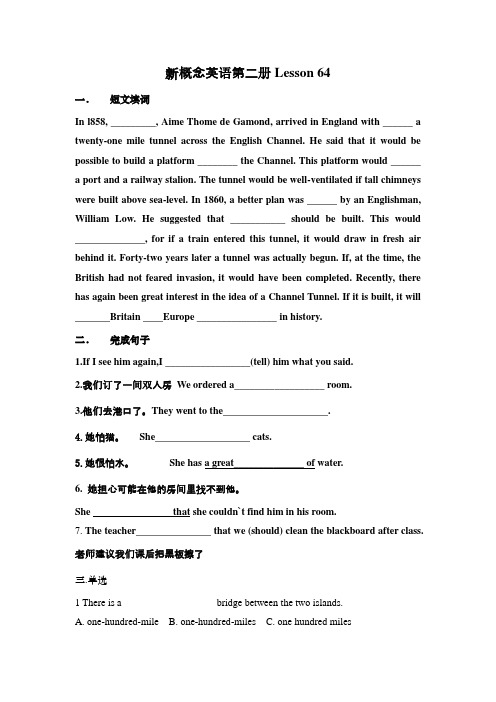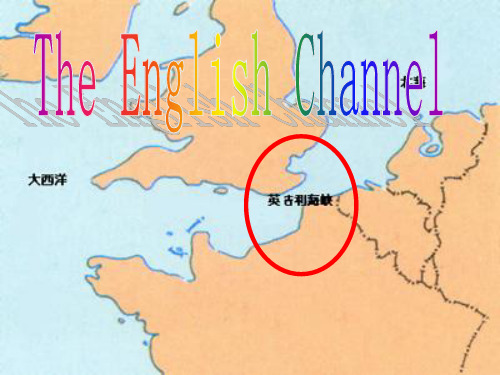新概念英语第二册_第64课课文详解及语法解析
新概念英语第二册Lesson 64(原创)

新概念英语第二册Lesson 64一.短文填词In l858, _________, Aime Thome de Gamond, arrived in England with ______ a twenty-one mile tunnel across the English Channel. He said that it would be possible to build a platform ________ the Channel. This platform would ______ a port and a railway stalion. The tunnel would be well-ventilated if tall chimneys were built above sea-level. In 1860, a better plan was ______ by an Englishman, William Low. He suggested that ___________ should be built. This would ______________, for if a train entered this tunnel, it would draw in fresh air behind it. Forty-two years later a tunnel was actually begun. If, at the time, the British had not feared invasion, it would have been completed. Recently, there has again been great interest in the idea of a Channel Tunnel. If it is built, it will _______Britain ____Europe ________________ in history.二.完成句子1.If I see him again,I _________________(tell) him what you said.2.我们订了一间双人房We ordered a__________________ room.3.他们去港口了。
新概念英语第二册64课 PPT

14
officially adv.
office n. 办公室,办公楼 officer n. 军官,政府官员 official 1. adj. 官方的,正式的,公务的,职权的 an official decision 官方决定 an official announcement 官方公告 2. n. 官员 government officials
28
这样就解决了通风问题, 因为如果有一列火车开进 隧道,它就把新鲜空气随之抽进了隧道。
draw in ( = take in ) 吸入、吸进 ;(火车、汽车) 进站, 到达, 吸引 • draw back • 撒回, 收回(承诺等), 拉起, 退却 • draw up • 起草,拟订;(使)停住
in the center of the Channel? (A platform.)
• 6. What would this platform serve as? (A port and a railway station.)
• 7. How would the tunnel be ventilated? (Tall chimneys would be built above sea level.)
• 2. Was he an engineer or an astronaut? (He was an engineer.)
• 3. What nationality was he? (French.)
• 4. What did he have a plan for?
新概念英语第二册 Lesson 64课件

the Continent
欧洲大陆
True or False
• Bcause AThmeeBrriictiasnh feared invasion,the first tunnel wasn`t completed. F
• AAnFErnegnlischmhane.WniglliianmeLeowr suggested a better plan two years later? F
如:Please connect the computer to internet. 把电脑连到因特网上
• European 欧洲人,欧洲的, 欧洲人的
• Europe
欧洲
• Asian
亚洲人,亚洲的,亚洲人的
• Asia
亚洲
• African 非洲人,非洲的,非洲人的
• Africa
非洲
• Oceanian 大洋洲的
• The Channel Tunnel was officially
opened on March 7,11998944.
F
• William Low’s idea was better than de Gamond’s because ______.
• A. it was cheaper • B.there were no chimneys in his plan • C. his tunnel would be better ventilated • D.it wouldn’t be necessary to build a platform in the centre
connect v.连接, 联合, 联系
(connection [kə'nek∫ən] n.) (connective [kə'nəktɪv] adj.)
新概念英语第二册64课

fear
1. n. [u] 恐惧,害怕 eg. The soldier didn't show his fear.
The child had no fear of water. 2. n. [c] 畏惧,不安 a fear of heights 恐高症 She has a great fear of fire.
Languaห้องสมุดไป่ตู้e Points
Key structures
条件句 1. 真实条件句:对将来可能发生的事情的假
设,主句用将来时,从句用现在时
If he is out, I'll call tomorrow.
You'll miss the train if you don't hurry.
2. 非真实条件句: A:对现在事实假设或对不可能事情假设
port n. 港,港口,港口城市 enter a port make a port 入港 leave a port clear a port 出港
【谚】the port in a storm
慌不择路,穷途之策
ventilate v.使空气流通,使空气进入
well-ventilated 通风良好的 poorly-ventilated 不通风的 eg. Our classroom is well-ventilated. ventilation n. [u] 空气流通,畅谈 put a problem to ventilation ventilator n. 通风设备,通风口
as if / as though “好像”句
He acted as if he had never lived in England before.
新概念英语第二册课文详解

新概念英语第二册课文详解新概念英语第二册课文详解课文详注一FurthernotesonthetextstweekIwenttothetheatre.上星期我去看戏。
(1)句首的“Lastweek”点明叙述的事情发生的时间是上星期。
因此整篇课文的时态基本上应是过去时(包括过去进行时),直接引语部分的时态除外。
(2)动词go的原义是离开一个地方去另一个地方,与介词to连用后,常加上主语所要去的目的地来代表主语的动作目的。
课文中gotothetheatre=gotothetheatretoseeaplay,即去剧场看戏。
类似的还有gotothecinema=gotothecinematoseeafilm(去电影院看电影)。
这种表达方式简明扼要。
请注意在以下的短语中名词前通常不加冠词:gotoschool上学gotobed上床睡觉gotochurch上教堂,去做礼拜(cf.第1册第68课atschool,atchurch;第1册第85课havebeentoschool/church)2.hadaverygoodseat座位很好seat一般指戏院、汽车等配置的固定座位,也可以抽象地表示“座位”或“位子”的概念:thefrontseatofacar汽车的前座Takeaseat,please.请坐。
3.Theplaywasveryinteresting.戏很有意思。
interesting属于现在分词形式的形容词,意思是“使人感兴趣”。
它通常与非人称主语连用或修饰某个事物:Thisisaninterestingbook/idea.这是一本有趣的书/一个令人感兴趣的主意。
4.…weresittingbehindme.Theyweretalkingloudly.……坐在我的身后,大声地说着话。
这两句的时态为过去进行时。
(cf.第7课语法)5.Igotveryangry.我变得非常生气。
get在这里有“逐渐变得”的含义,接近become,是个表示过程的动词,表示状态的变化。
Lesson64TheChannelTunnel课文详解与练习-新概念英语第二册

新概念英语第二册Lesson 64The Channel Tunnel 海峡隧道In 1858, a French engineer, Aime Thome de Gamond, arrived in England with a plan for a twenty-one-mile tunnel under the English Channel. He said that it would be possible to build a platform in the centre of the Channel. This platform would serve as a port and a railway station. The tunnel would be well-ventilated if tall chimneys were built above sea level. In 1860, a better plan was put forward by an Englishman, William Low. He suggested that a double railway-tunnel should be built. This would solve the problem of ventilation, for if a train entered this tunnel, it would draw in fresh air behind it.Forty-two years later a tunnel was actually begun. If, at the time, the British had not feared invasion, it would have been completed. The world had to wait almost another 100 years for the Channel Tunnel. It was officially opened on March 7,1994, finally connecting Britain to the European continent.【课文翻译】In 1858, a French engineer, Aime Thome de Gamond, arrived in England with a plan for a twenty-one-mile tunnel under the English Channel.1858年,一位名叫埃梅.托梅.德.干蒙的法国工程师带着建造一条长21英里、穿越英吉利海陕的隧道计划到了英国。
新概念英语第二册64课 PPT

tunnel
1. n. 地下通道,隧道,地道 a passage under a river or the sea, or through
the hills. The Channel Tunnel 海峡隧道 eg. The train passes through several tunnels.
v.使空气流通,使空气进入 well-ventilated 通风良好的 poorly-ventilated 不通风的 eg. Our classroom is well-ventilated.
n. [u] 空气流通,畅谈 put a problem to ventilation 提出问题以供公开讨论
游客涌入这座城市 invader n. 入侵者,侵略者 invasion n. 侵略 eg. The invasion of Poland by Germany in 1939. 1939年德国队波兰的侵略
14
officially adv.
office n. 办公室,办公楼 officer n. 军官,政府官员 official 1. adj. 官方的,正式的,公务的,职权的 an official decision 官方决定 an official announcement 官方公告 2. n. 官员 government officials
12
fearful adj.可怕的,害怕的 a fearful storm 一场可怕的暴风 The baby is fearful of loud noise.
fearless adj.不怕的,无畏的
13
Байду номын сангаас
invade v. 侵略,侵犯
invade a small country invade sb's rights 侵犯某人的权利 eg:tourists invade the city
新概念英语第二册Lesson 64 (共74张PPT)

go) to visit you.
Grammar
• Ken got to the station in time to catch the
train. If ___h_e_h__a_d_m__i_s_s_e_d(ihte / miss), _h__e_w__o_u_l_d__h_a_v_e__b_e(ehne / be)late for his
• What did he say it would be possible to build in the center of the Channel?
• A platform.
Comprehension questions
• What would this platform serve as? • A port and a railway station.
• If father ___w__e_r_ealive, he would be horrified.
Grammar
• If it ___i_s_ (be) fine tomorrow, we shall go for
a swim.
Grammar
• I didn’t know you were in hospital. If
• 恐惧
New words and expressions
• All his students fear him.
New words and expressions
• She feared ___totell him the truth.
New words and expressions
- 1、下载文档前请自行甄别文档内容的完整性,平台不提供额外的编辑、内容补充、找答案等附加服务。
- 2、"仅部分预览"的文档,不可在线预览部分如存在完整性等问题,可反馈申请退款(可完整预览的文档不适用该条件!)。
- 3、如文档侵犯您的权益,请联系客服反馈,我们会尽快为您处理(人工客服工作时间:9:00-18:30)。
新概念英语第二册:第64课课文详解及语法解析
课文详注 Further notes on the text
1.a plan for a twenty-one-mile tunnel,建造一条长 21英里的隧道的计划。
twenty-one-mile作 tunnel的修饰语,注意 mile为单数。
plan for +名词/动名词表示“……的计划”:
They always make plans for their holidays, but, in the end, they always stay at home.
他们总是为假期制订各种计划,但是,末了,他们总是呆在家里。
He came with a plan for (building) a bridge over the river.
他带来了在这条河上建一座桥的计划。
2.serve as,充当,起……的作用(也可以说 serve for)。
The books on the floor may serve as/ for a carpet.
地板上的书可充当地毯用了。
This sofa can serve as/ for(a) bed.
这张沙发可以当床用。
3.a better plan was put forward, 提出了一项更好的计划。
put forward为固定短语,可分开用,其含义之一是“提出(计划、建议等)”:
You know they wouldn't accept your plan. Why did you put it forward?
你知道他们不会接受你的计划。
你为什么要提出来呢?
Has he put forward any suggestion?
他提出什么建议了吗?
4.He suggested that a double railway-tunnel should be built.他提
议建一条双轨隧道。
suggest后面跟从句时,从句的谓语动词形式为 should(可省略)+动词原形(cf.第63课语法):
He suggested (that) they (should) change the plans.
他建议他们改变计划。
suggest后面也可以跟名词或动名词形式。
(cf.第47课词汇学习)
5.It was officially opened on March 7,1994, finally connecting Britain to the European continent.它于1994年3月7日正式开通,将英国与欧洲大陆连到了一起。
现在分词 connecting 引导的短语相当于一个并列分句。
connect表示“连接”、“连结”,可与to或with连用:
This road connects the willage with/to London.
这条公路连接着这个村子与伦敦。
The lake and the canal are connected by a river.
这个湖与运河之间由一条小河相连。
语法 Grammar in use
第3类条件句
(1)在第16课的语法中,我们学习了用第1类条件句表示将来很可能发生的事:
If you park your car in the wrong place, a traffic policeman will soon find it.
一旦你把汽车停错了地方,交通警便很快就会发现。
在第40课的语法中,我们学习了用第2类条件句谈论想像中的情况或描写完全不可能的事:
If you ate more and talked less, we would both enjoy our dinner!
如果你多吃点,少说点,我们两个都会吃得好的!
If I were you, I would not go to London tomorrow.
如果我是你,我明天就不去伦敦。
(婉转的建议)
(2)第3类条件句的基本结构与前两类都不一样,if从句需用过去完成时,主句用would have/should have+过去分词形式:
If it had rained, we would have stayed at home.
要是下雨,我们就会呆在家里了。
第3类条件句在if从句里设想纯粹想像的事情,在主句里讲述想像的结果。
它与第2类条件句有一定的相似之处。
但是,第3类条件句所谈的是没有或永远不可能有的结果,因为它们指的是过去没有过的事情。
它们是所谓的“假设条件句”:
If I had worked harder at school, I'd have go a better job.
要是我上学时勤奋一些,我就会有较好的工作了。
(事实是现在的工作不太好)
在 if从句中可用 could have+过去分词代替 had been able to +动词原形:
Why didn't you read the book yesterday?
你昨天为什么没有看这本书?
I'd have read it if I could have bought it!
如果咋夭我能买到这书我就会读的!。
